| Author |
Message |
ivica
Moderator

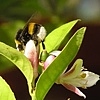
Joined: 08 Jan 2007
Posts: 658
Location: Sisak, Croatia, zone 7b
|
| Posted: Sat 14 Jun, 2008 12:05 pm |
|
This season seems to be extremly good for this inground /unusual/ Poncirus Trifoliata seedling
(about 6 years old, less than 2m tall, not yet flowered):
Example of leafs which are by my layman understanding extremely large:
(photos taken today):



What is 'normal' leaf size for poncirus ?
_________________
 |
|
| Back to top |
|
 |
Askhat
Joined: 27 May 2008
Posts: 10
Location: Kazakhstan, Almaty
|
| Posted: Fri 20 Jun, 2008 1:32 pm |
|
| ivica wrote: | This season seems to be extremly good for this inground /unusual/ Poncirus Trifoliata seedling
(about 6 years old, less than 2m tall, not yet flowered):
Example of leafs which are by my layman understanding extremely large:
(photos taken today):



What is 'normal' leaf size for poncirus ? |
I think that it normal not bigger 5-6 cm and not smaller 1 cm
_________________
citrus and allabout ctrus |
|
| Back to top |
|
 |
ivica
Moderator


Joined: 08 Jan 2007
Posts: 658
Location: Sisak, Croatia, zone 7b
|
| Posted: Sat 12 Jul, 2008 10:27 am |
|
Other Poncirus, the biggest thorn I ever saw (photo taken 2008-07-10):

How unusual is that ?
_________________
 |
|
| Back to top |
|
 |
ivica
Moderator


Joined: 08 Jan 2007
Posts: 658
Location: Sisak, Croatia, zone 7b
|
| Posted: Mon 25 Jan, 2010 1:18 pm |
|
BigLeaf fights back, even bigger thorn, photo 2010-01-25:

Prior one is now dried and impregnated:

Their mother tree is here:
link
_________________
 |
|
| Back to top |
|
 |
ivica
Moderator


Joined: 08 Jan 2007
Posts: 658
Location: Sisak, Croatia, zone 7b
|
| Posted: Wed 24 Nov, 2010 6:20 pm |
|
BigLeaf broke own record this season, photos follows:
Maybe the biggest leaf, more than 9cm (petiole included):

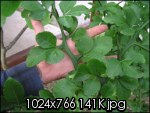
Environment:

My thought previously was that this PT seedling behaviour is mainly due to its position, growing on the west side with rooth area shaded from the sun... Now, I don't know. Kiwi trunk is a meter to the left!
Top growth:

Big leaves previously was in lower canopy only, now they can be found in top growth too.
A few flowers was there this year, no fruits set.
This seedling is equaly old as one which is host of my XXX Lemon experiment. That seedling is productive for last 3 years.
Those seedlings deserves the name.
From now on, I'll refer to those (mother tree included) in my posts here as:
Poncirus Trifoliata "Siscia"
Short name: PT Siscia
Also, my XXX Lemon link I'll call from now on:
Citrus Limon "Siscia"
Short name: Siscia Lemon
Citrus history in Mediterranean starts with Romans, Siscia is the name of Romans town on the left side of river Kupa. Segestica is the name of (Ilirs, Kelts) village on the right side.
I did my both findings (PT, Lemon) on the left side of the river Kupa and hence the sufix "Siscia".
EDIT: added short names for Siscia trees.
_________________
 |
|
| Back to top |
|
 |
Lemandarangequatelo
Citruholic


Joined: 01 Mar 2010
Posts: 485
Location: UK
|
| Posted: Wed 24 Nov, 2010 6:46 pm |
|
Ivica great photo's and research, very enjoyable to read and see. |
|
| Back to top |
|
 |
ivica
Moderator


Joined: 08 Jan 2007
Posts: 658
Location: Sisak, Croatia, zone 7b
|
| Posted: Sun 23 Jan, 2011 6:43 pm |
|
Lemandarangequatelo, thank you for your kind comment.
BigLeaf-BigThorn, photographed mid January 2011:
More I look, more I like what I see
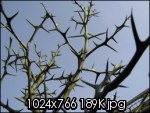
Mighty thorns are the first line of defense in case of hail...
While trunks and twig carriers have longer and almost straight thorns,
flower bud bearing twigs have smaller and curved thorns, like a bull's horn.
Bull's Horn

Flower buds

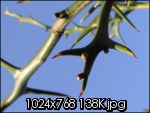
Late August/early September is the time when PT Siscia starts building flower buds for bloom next spring.
PT is never realy dormant over winter and makes use of more-or-less every mild period acquiring mass (increasing trunk diameter) and enlarging flower buds.
_________________
 |
|
| Back to top |
|
 |
ivica
Moderator


Joined: 08 Jan 2007
Posts: 658
Location: Sisak, Croatia, zone 7b
|
| Posted: Tue 15 Feb, 2011 5:57 am |
|
GRIN database has Poncirus Trifoliata 'BIG-LEAF' cultivar listed here
http://www.ars-grin.gov/cgi-bin/npgs/acc/display.pl?1500162
Does anyone have more information (a photo maybe?) about max size of leaf of that cultivar?
Are those leaves bigger than the leaves found on my cultivar (photos given previously, Nov 24, 2010) 
_________________
 |
|
| Back to top |
|
 |
ivica
Moderator


Joined: 08 Jan 2007
Posts: 658
Location: Sisak, Croatia, zone 7b
|
| Posted: Tue 05 Apr, 2011 6:10 am |
|
Here is what I got from Robert R Krueger, Horticulturist and Curator at USDA-ARS:
"The trifoliates are classified into "big leaf" and "little leaf" selections but
the "big leaf" selections do not have particularly large leaves."
BTW:
Bull's Horn, photo 2011-04-03:
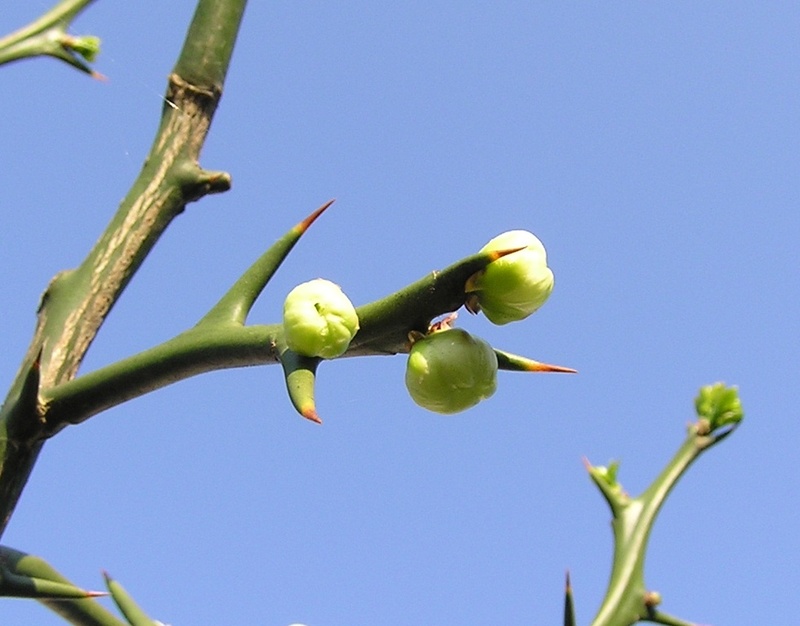
_________________
 |
|
| Back to top |
|
 |
ivica
Moderator


Joined: 08 Jan 2007
Posts: 658
Location: Sisak, Croatia, zone 7b
|
| Posted: Fri 15 Apr, 2011 2:55 pm |
|
Month ago I did this

to remove invasive kiwi roots which intrude Bulls Horn roots area, roots like this

and insert a barrier there.
Should be good for a while, keeping in mind that kiwi roots are "clever" enough to attack from below...
_________________
 |
|
| Back to top |
|
 |
Millet
Citruholic


Joined: 13 Nov 2005
Posts: 6657
Location: Colorado
|
| Posted: Fri 15 Apr, 2011 5:08 pm |
|
I have never heard of Poncirus Trifoliata classified as either big leaf and little leaf, but two very common classifications for Poncirus Trifoliata are big flower and little flower varieties. - Millet (640-) |
|
| Back to top |
|
 |
ivica
Moderator


Joined: 08 Jan 2007
Posts: 658
Location: Sisak, Croatia, zone 7b
|
| Posted: Sat 16 Apr, 2011 9:19 am |
|
Millet, where I can read more about those common classifications (by flower size) ?
I do have 7 mature PT Siscia trees under watch so far. Mother tree and 6 about equaly old seedlings, 2 in my backyard and 4 in neighbourhood.
My favourite one and the most often observed is the tree which showed me 5 inches long thorn and 3.5 inches long leaves. That tree I'll call Bull's Horn.
Bull's Horn flowers
Photo 2011-04-10


I see two types of flowers:
1. with fully developed Gynoecium, let's call it Female flower
2. undeveloped Gynoecium (is it proper term?), let's call it Male flower
Female flower, Photo 2011-04-15
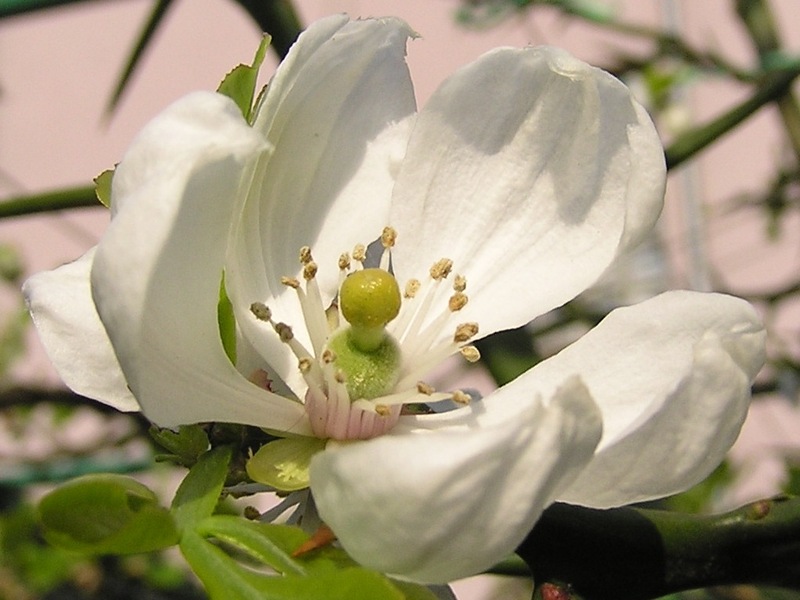
Male flower, Photo 2011-04-15

Current bloom has about equal percentage of female and male flowers.
Diameter of a flower is in the range of 5-7 centimeters.
Male flowers are smaller, on average, than female flowers.
Flowers have 5 petals, except noted exception: 2 female flowers with 7 petals.
Photo 2011-04-13, after windy night with wind gusts over 70 km/h:
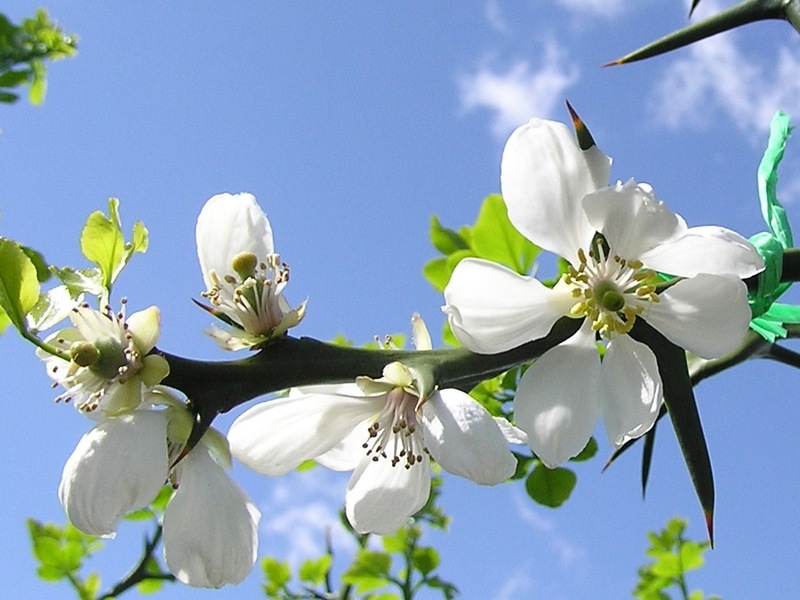
Flower with 7 petals is the rightmost one.
Both 7 petals flowers are marked, just in case if there will be any difference in fruits...
A metric, Photo 2011-04-09

Relaxation item, acapella song "Wild flower":
http://www.youtube.com/watch?v=-RIXdvtCF8s&feature=related
_________________
 |
|
| Back to top |
|
 |
ivica
Moderator


Joined: 08 Jan 2007
Posts: 658
Location: Sisak, Croatia, zone 7b
|
| Posted: Thu 21 Apr, 2011 4:44 pm |
|
Observing Bull's Horn tree today
I've found this strange looking fallen flower hanging on a thorn:

I'm quite sure that one petal is missing and that total number of petals was 11!
Diameter of the flower is about 7.2 cm.
Looking what else can be found on the ground I've found this:
Maybe the largest flower of this spring bloom, about 7.5 cm diameter, 7 petals

In the front is an artefact (which belongs to the flower, now separated) for which I'm not sure what it is. Atrofied petal maybe?
In both cases the flowers had only 5 sepals!

_________________
 |
|
| Back to top |
|
 |
Sylvain
Site Admin


Joined: 16 Nov 2007
Posts: 790
Location: Bergerac, France.
|
| Posted: Sat 23 Apr, 2011 9:40 am |
|
You have so many strange things that you might verify if your house isn't built on radioactive discharge!
 |
|
| Back to top |
|
 |
Sylvain
Site Admin


Joined: 16 Nov 2007
Posts: 790
Location: Bergerac, France.
|
| Posted: Sun 24 Apr, 2011 12:52 pm |
|
I just looked carefully to my citrus flowers. The number of petals range from 3 to 8.
On the clementines and mandarins they are nearly aways 5 petals, but on the Moi lemon they are more numerous. |
|
| Back to top |
|
 |











































